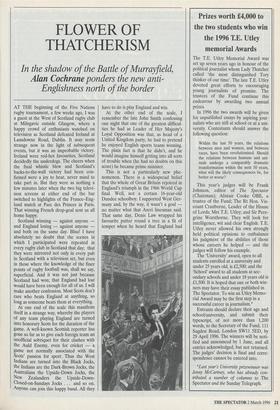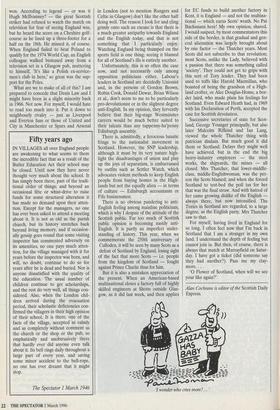FLOWER OF THATCHERISM
In the shadow of the Battle of Murrayfield, Alan Cochrane ponders the new anti- Englishness north of the border AT THE beginning of the Five Nations rugby tournament, a few weeks ago, I was a guest at the West of Scotland rugby club at Milngavie outside Glasgow, where a happy crowd of enthusiasts watched on television as Scotland defeated Ireland at Lansdowne Road, Dublin. It may seem strange now in the light of subsequent events, but it was an improbable victory. Ireland were red-hot favourites, Scotland decidedly the underdogs. The cheers when the final whistle blew and Scotland's backs-to-the-wall victory had been con- firmed were a joy to hear, never mind to take part in. But they were as nothing a few minutes later when the two big televi- sion screens at either end of the bar switched to highlights of the France–Eng- land match at Parc des Princes in Paris. That winning French drop-goal sent us all home happy.
Scotland winning — against anyone and England losing — against anyone and both on the same day. Bliss! I have absolutely no doubt that the scenes in which I participated were repeated in every rugby club in Scotland that day; that they were mirrored not only in every pub in Scotland with a television set, but even in those where the knowledge of the finer points of rugby football was, shall we say, superficial. And it was not just because Scotland had won; that England had lost would have been enough for all of us. I will make another confession. Most Scots don't care who beats England at anything, so long as someone beats them at everything.
At one end of the scale this manifests itself in a strange way, whereby the players of any team playing England are turned into honorary Scots for the duration of the game. A well-known Scottish reporter has gone so far as to give each foreign team an unofficial sobriquet for their clashes with the Auld Enemy, even for cricket — a game not normally associated with the Scots' passion for sport. Thus the West Indians are turned into the Black Jocks, the Indians are the Dark-Brown Jocks, the Australians the Upside-Down Jocks, the New Zealanders the Upside-Down- Closed-on-Sundays Jocks . . . and so on. Anyone can join this happy band. All they have to do is play England and win.
At the other end of the scale, I remember the late John Smith confessing one night that one of the greatest difficul- ties he had as Leader of Her Majesty's Loyal Opposition was that, as head of a United Kingdom party, he had to pretend he enjoyed English sports teams winning. The plain fact is that he didn't, and he would imagine himself getting into all sorts of trouble when (he had no doubts on this score) he became prime minister.
This is not a particularly new phe- nomenon. There is a widespread belief that the whole of Great Britain rejoiced in England's triumph in the 1966 World Cup final. Well, not a certain 16-year-old Dundee schoolboy. I supported West Ger- many and, by the way, it wasn't a goal no matter what that Azeri linesman said. That same day, Denis Law wrapped his favourite putter round a tree in a fit of temper when he heard that England had won. According to legend — or was it Hugh Mcllvanney? — the great Scottish striker had refused to watch the match on television for fear of seeing England win, but he heard the score on a Cheshire golf- course as he lined up a three-footer for a half on the 18th. He missed it, of course. When England failed to beat Poland to qualify for the 1974 World Cup, an English colleague walked bemused away from a television set in a Glasgow pub, muttering to himself, 'It's like a Polish ex-service- men's club in here,' so great was the sup- port for the Poles.
What are we to make of all of this? I am prepared to concede that Denis Law and I might have been in a slight minority back in 1966. Not now. For myself, I would hate to read too much into it. Put it down to neighbourly rivalry — just as Liverpool and Everton fans or those of United and City in Manchester or Spurs and Arsenal in London (not to mention Rangers and Celtic in Glasgow) don't like the other half doing well. The reason I look for and cling grimly onto such an excuse is that there is a much greater antipathy towards England and the English today, and that is not something that I particularly enjoy. Watching England being thumped on the sports field is one thing; seeing it blamed for all of Scotland's ills is entirely another.
Unfortunately, this is so often the case now, and not necessarily only among opposition politicians either. Labour's leaders in Scotland are decidedly Unionist and, in the persons of Gordon Brown, Robin Cook, Donald Dewar, Brian Wilson et al., don't seem to me to be particularly pro-devolutionist or in the slightest degree anti-English. In my opinion, they fervently believe that their big-stage Westminster careers would be much better suited to their talents than any tuppenny-ha'penny Edinburgh assembly.
There is, admittedly, a ferocious lunatic fringe to the nationalist movement in Scotland. However, the SNP leadership, although it must by its very nature high- light the disadvantages of union and play up the joys of separatism, is embarrassed by outfits such as Settler Watch, which advocates violent methods to keep English people from buying homes in the High- lands but not the equally alien — in terms of culture — Edinburgh accountants or Fife businessmen.
There is no obvious pandering to anti- English feeling among mainline politicians, which is why I despair of the attitude of the Scottish public. Far too much of Scottish public opinion is becoming nastily anti- English. It is partly an imperfect under- standing of history. This year, when we commemorate the 250th anniversary of Culloden, it will be seen by many Scots as a defeat of Scotland by England, losing sight of the fact that more Scots — i.e. people from the kingdom of Scotland — fought against Prince Charlie than for him.
But it is also a mistaken appreciation of the present. When an American-based multinational closes a factory full of highly skilled engineers at Shotts outside Glas- gow, as it did last week, and then applies for EC funds to build another factory in Kent, it is England — and not the multina- tional — which earns Scots' wrath. No Pat Buchanans here! My own opinion, shared, I would suspect, by most commentators this side of the border, is that gradual and gen- eral alienation was largely brought about by one factor — the Thatcher years. Most Scots did not subscribe to that revolution; most Scots, unlike the Lady, believed with a passion that there was something called `society'. They could not get to grips with this sort of Tory leader. They had been used to toffs like Harold Macmillan, who boasted of being the grandson of a High- land crofter, or Alec Douglas-Home, a bor- der laird, who made plain his feelings for Scotland. Even Edward Heath had, in 1969 with his Declaration of Perth, accepted the case for Scottish devolution.
Successive secretaries of state for Scot- land, George Younger principally, but also later Malcolm Rifkind and Ian Lang, viewed the whole Thatcher thing with patrician disdain. But much good it did them or Scotland. Delays they might well have achieved, but in the end the big heavy-industry employers — the steel works, the shipyards, the mines — all closed. Mrs Thatcher, that lower-middle- class, middle-Englishwoman, was the per- son the Scots blamed; and when she forced Scotland to test-bed the poll tax for her that was the final straw. And with hatred of her came growing dislike of the English always there, but now intensified. The Tories in Scotland are regarded, to a large degree, as the English party. Mrs Thatcher saw to that.
For myself, having lived in England for so long, I often feel now that I'm back in Scotland that I am a stranger in my own land. I understand the depth of feeling but cannot join in. But then, of course, there is always that match at Murrayfield on Satur- day. I have got a ticket (did someone say they had another?). Pass me my clay- more. . . .
`0 Flower of Scotland, when will we see your like again?'
Alan Cochrane is editor of the Scottish Daily Express.
I wonder who cries more?. .. '



































































 Previous page
Previous page